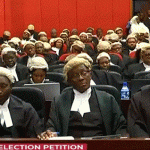YouTube has suspended video channel of the far-right Portuguese ultranationalist Grupo 1143 after a news piece highlighted its inflammatory content.
The online video-sharing platform stated that it blocked the account for violating its hate speech policy, following a New York Times article that examined social media posts criticizing immigrants and cited examples in the UK, Portugal, and other countries where vitriolic language is now spilling onto the streets.
Grupo 1143 is led by Mario Machado, a neo-Nazi activist whose anti-Islam and anti-migrant campaigns have been gaining attention and spreading across the southern European country.
The group was accused of peddling a “toxic brew of bigotry online” that incited real-world violence in nations across Europe, including Germany and Ireland, as well as in Portugal.
YouTube’s hate speech policy prohibits videos or content that incites violence or hatred towards individuals or groups based on people’s nationality, religion, or immigration status, among other things.
The extreme-right group, renowned for waving torches and flashing Nazi German salutes, staged rallies against the Islamisation of Europe earlier this year, including one in Lisbon in February despite a local government prohibition and another in Porto in April.
YouTube has suspended video channel of the far-right Portuguese ultranationalist Grupo 1143 after a news piece highlighted its inflammatory content.
The online video-sharing platform stated that it blocked the account for violating its hate speech policy, following a New York Times article that examined social media posts criticizing immigrants and cited examples in the UK, Portugal, and other countries where vitriolic language is now spilling onto the streets.
Grupo 1143 is led by Mario Machado, a neo-Nazi activist whose anti-Islam and anti-migrant campaigns have been gaining attention and spreading across the southern European country.
The group was accused of peddling a “toxic brew of bigotry online” that incited real-world violence in nations across Europe, including Germany and Ireland, as well as in Portugal.
YouTube’s hate speech policy prohibits videos or content that incites violence or hatred towards individuals or groups based on people’s nationality, religion, or immigration status, among other things.
The extreme-right group, renowned for waving torches and flashing Nazi German salutes, staged rallies against the Islamisation of Europe earlier this year, including one in Lisbon in February despite a local government prohibition and another in Porto in April.
YouTube has suspended video channel of the far-right Portuguese ultranationalist Grupo 1143 after a news piece highlighted its inflammatory content.
The online video-sharing platform stated that it blocked the account for violating its hate speech policy, following a New York Times article that examined social media posts criticizing immigrants and cited examples in the UK, Portugal, and other countries where vitriolic language is now spilling onto the streets.
Grupo 1143 is led by Mario Machado, a neo-Nazi activist whose anti-Islam and anti-migrant campaigns have been gaining attention and spreading across the southern European country.
The group was accused of peddling a “toxic brew of bigotry online” that incited real-world violence in nations across Europe, including Germany and Ireland, as well as in Portugal.
YouTube’s hate speech policy prohibits videos or content that incites violence or hatred towards individuals or groups based on people’s nationality, religion, or immigration status, among other things.
The extreme-right group, renowned for waving torches and flashing Nazi German salutes, staged rallies against the Islamisation of Europe earlier this year, including one in Lisbon in February despite a local government prohibition and another in Porto in April.
YouTube has suspended video channel of the far-right Portuguese ultranationalist Grupo 1143 after a news piece highlighted its inflammatory content.
The online video-sharing platform stated that it blocked the account for violating its hate speech policy, following a New York Times article that examined social media posts criticizing immigrants and cited examples in the UK, Portugal, and other countries where vitriolic language is now spilling onto the streets.
Grupo 1143 is led by Mario Machado, a neo-Nazi activist whose anti-Islam and anti-migrant campaigns have been gaining attention and spreading across the southern European country.
The group was accused of peddling a “toxic brew of bigotry online” that incited real-world violence in nations across Europe, including Germany and Ireland, as well as in Portugal.
YouTube’s hate speech policy prohibits videos or content that incites violence or hatred towards individuals or groups based on people’s nationality, religion, or immigration status, among other things.
The extreme-right group, renowned for waving torches and flashing Nazi German salutes, staged rallies against the Islamisation of Europe earlier this year, including one in Lisbon in February despite a local government prohibition and another in Porto in April.
YouTube has suspended video channel of the far-right Portuguese ultranationalist Grupo 1143 after a news piece highlighted its inflammatory content.
The online video-sharing platform stated that it blocked the account for violating its hate speech policy, following a New York Times article that examined social media posts criticizing immigrants and cited examples in the UK, Portugal, and other countries where vitriolic language is now spilling onto the streets.
Grupo 1143 is led by Mario Machado, a neo-Nazi activist whose anti-Islam and anti-migrant campaigns have been gaining attention and spreading across the southern European country.
The group was accused of peddling a “toxic brew of bigotry online” that incited real-world violence in nations across Europe, including Germany and Ireland, as well as in Portugal.
YouTube’s hate speech policy prohibits videos or content that incites violence or hatred towards individuals or groups based on people’s nationality, religion, or immigration status, among other things.
The extreme-right group, renowned for waving torches and flashing Nazi German salutes, staged rallies against the Islamisation of Europe earlier this year, including one in Lisbon in February despite a local government prohibition and another in Porto in April.
YouTube has suspended video channel of the far-right Portuguese ultranationalist Grupo 1143 after a news piece highlighted its inflammatory content.
The online video-sharing platform stated that it blocked the account for violating its hate speech policy, following a New York Times article that examined social media posts criticizing immigrants and cited examples in the UK, Portugal, and other countries where vitriolic language is now spilling onto the streets.
Grupo 1143 is led by Mario Machado, a neo-Nazi activist whose anti-Islam and anti-migrant campaigns have been gaining attention and spreading across the southern European country.
The group was accused of peddling a “toxic brew of bigotry online” that incited real-world violence in nations across Europe, including Germany and Ireland, as well as in Portugal.
YouTube’s hate speech policy prohibits videos or content that incites violence or hatred towards individuals or groups based on people’s nationality, religion, or immigration status, among other things.
The extreme-right group, renowned for waving torches and flashing Nazi German salutes, staged rallies against the Islamisation of Europe earlier this year, including one in Lisbon in February despite a local government prohibition and another in Porto in April.
YouTube has suspended video channel of the far-right Portuguese ultranationalist Grupo 1143 after a news piece highlighted its inflammatory content.
The online video-sharing platform stated that it blocked the account for violating its hate speech policy, following a New York Times article that examined social media posts criticizing immigrants and cited examples in the UK, Portugal, and other countries where vitriolic language is now spilling onto the streets.
Grupo 1143 is led by Mario Machado, a neo-Nazi activist whose anti-Islam and anti-migrant campaigns have been gaining attention and spreading across the southern European country.
The group was accused of peddling a “toxic brew of bigotry online” that incited real-world violence in nations across Europe, including Germany and Ireland, as well as in Portugal.
YouTube’s hate speech policy prohibits videos or content that incites violence or hatred towards individuals or groups based on people’s nationality, religion, or immigration status, among other things.
The extreme-right group, renowned for waving torches and flashing Nazi German salutes, staged rallies against the Islamisation of Europe earlier this year, including one in Lisbon in February despite a local government prohibition and another in Porto in April.
YouTube has suspended video channel of the far-right Portuguese ultranationalist Grupo 1143 after a news piece highlighted its inflammatory content.
The online video-sharing platform stated that it blocked the account for violating its hate speech policy, following a New York Times article that examined social media posts criticizing immigrants and cited examples in the UK, Portugal, and other countries where vitriolic language is now spilling onto the streets.
Grupo 1143 is led by Mario Machado, a neo-Nazi activist whose anti-Islam and anti-migrant campaigns have been gaining attention and spreading across the southern European country.
The group was accused of peddling a “toxic brew of bigotry online” that incited real-world violence in nations across Europe, including Germany and Ireland, as well as in Portugal.
YouTube’s hate speech policy prohibits videos or content that incites violence or hatred towards individuals or groups based on people’s nationality, religion, or immigration status, among other things.
The extreme-right group, renowned for waving torches and flashing Nazi German salutes, staged rallies against the Islamisation of Europe earlier this year, including one in Lisbon in February despite a local government prohibition and another in Porto in April.














